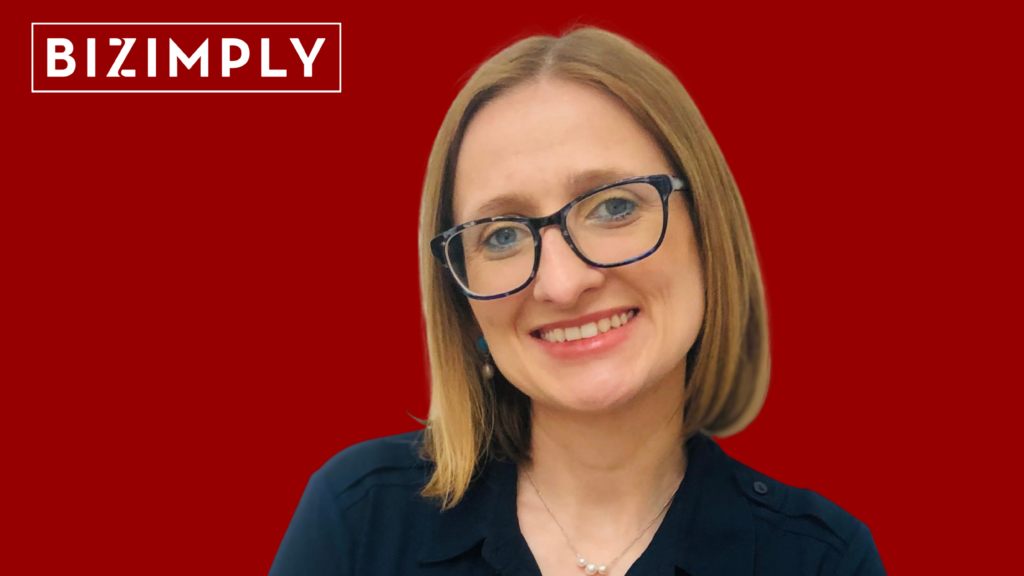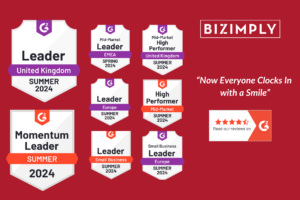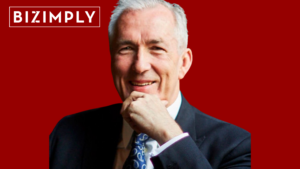“Because let’s be honest, it’s easy to be happy when everything is gravy and groovy. That’s easy. I think it’s much harder to find happiness when things are really challenging. So the happiness podcast, the happiness challenge podcast does exactly this. I’m trying to test-drive the best happiness hacks that are out there to be able to manage and be happy when things are tougher.”
Klaudia Mitura
After a little hiatus, we are back with our BlogCast, a Bizimply blog series!
🎧 A series where we will be revisiting Bizimply’s favourite episodes from The Hospitality Mavericks Podcast.
The show, hosted by Michael Tingsager, brings together Mavericks around the world who don’t think like everyone else. — make sure to check out the latest BlogCasts.
Meet Klaudia Mitura: A work psychologist, a learning and development specialist at the Science Museum Group and a podcaster at The Happiness Challenge.
Klaudia’s purpose is to help boost happiness in the workplace, so she has been scientifically testing happiness. You can check out some of her articles on well-being in hospitality at Caterer.com.
Keep reading to find out more about how her passion for science and happiness helped her navigate the current challenges in the workplace.
Main Highlights:
- What is the definition of happiness?
- The powerful impact of consistency.
- The happiness paradox.
- Social connections in the digital world.
Journey after Hospitality: From losing her job in the hospitality sector to the happiness challenge.
What is happiness? How does it impact us, positively and negatively, if we don’t cultivate it?
“Back in 2020, I had a very difficult time period, as you may remember from that first episode, because as many, the pandemic cut me out from my family, and I lost my job within the hospitality sector. I needed to cancel my wedding and later on that year, I got very, very sick with COVID and had a long COVID for ages. And also both my father and my sister were diagnosed with cancer. So actually when I saw you.”
“Things were okay, I was managing and then things went really, very difficult. During this difficult period of time, I wanted to have a positive purpose and hence I started the happiness challenge. I wanted to experiment and apply scientific research on happiness to my daily ups and downs. Because let’s be honest, it’s easy to be happy when everything is gravy and groovy. That’s easy. I think it’s much harder to find happiness when things are really challenging. So the happiness podcast, the happiness challenge podcast does exactly this. I’m trying to test drive the best happiness hacks that are out there to be able to manage and be happy when things are tougher.”
“I’ve been continuing to learn more about the happiness and the science of happiness, and we’re going to dive deeper into that. But I also started a new role as a learning and development manager at the Science Museum Group where I lead on building learning culture and strengthening the engagement of over 1,500 colleagues across seven different sites. So that’s from that professional level and from a personal level, both my father and my sister, they’re doing very well. They own constant checkups, as always, and we live from a checkup to a checkup, but overall things did get better. And I did have to have my wedding in Poland, which was amazing as well last year. So all in all, things got better and definitely improved.”

“Because let’s be honest, it’s easy to be happy when everything is gravy and groovy. […] I think it’s much harder to find happiness when things are really challenging. So the happiness podcast, the happiness challenge podcast does exactly this. I’m trying to test-drive the best happiness hacks that are out there to be able to manage and be happy when things are tougher.”
The power of consistency: The science of happiness.
What is the mission of the happiness challenge?
“So the happiness challenge started with the idea of giving me a purpose to concentrate on something different, something positive when I was dealing with so many different difficulties. A mind break to think about something else.”
“And then also helped me to learn about what is actually happiness. We all speak about happiness, we all say we want to be happy, but what on earth is it and how can you achieve it when things are especially difficult?”
“So why turn it into a science? Because I’m a work psychologist and I love to describe myself as a scientist, I just wanted to know what has been out there researched, and most importantly, how can this work for me. So the happiness challenge, the way it works is that I interview a well-being and happiness researcher, happiness experts on my podcast, I learn from them, and then I test out the different happiness hacks.”
“And then I come back to my audience and say, well, this is what I’ve learned. This is how you could use it. And sometimes my experience confirms the research. Sometimes it contradicts. It is really interesting, which is even more juicy then.”
I dare people to be happy by stopping, pausing and creating. To think about how we can be happier, how we can create more happiness rather than relying on our brain to dish out all these different emotions every day. “So in a nutshell, I dare people to be happy by experimenting with the science of happiness.”
“So in a nutshell, I dare people to be happy by experimenting with the science of happiness.”
Is happiness an individual journey or we can replicate another’s person experience?
“Happiness is an individual journey, an individual experience. And I think prescribing people saying that, okay, if you do this, you’ll be consistently happy all the time. It’s fake. It doesn’t work like that. We have different experiences, different environments in which we operate, different values, different likes and dislikes. And it’s absolutely okay to try something and say, I understand that science advises that this is good for us, but it’s not for me. It’s maybe not for you in that particular format. Maybe you could try the way you’re using a certain hack. But sometimes it’s okay to say, you know what? This is not for me. I’m actually going to do something else. And that’s okay.”
The two components of happiness.
How do you define happiness?
“So for me personally, it’s about two components when I think about happiness. First of all, it’s about feeling in my own skin, feeling good in my own skin. So thinking about a moment in this particular moment. Okay. I feel good. I feel positive. I may feel joyous, and energetic, you name it, but I feel good in my own skin.”
“And then there is a broader perspective […] which is how satisfied and happy I am with my overall life. For me, that distinction between now and that global perspective was very important because that meant that, okay, I may be experiencing big feelings of anger, and frustration, sadness, but I might be still happy because I’m satisfied with my life. And for me, that distinction between the overall perspective and the here-and-now perspective and balancing those two is what happiness is about.”
“And as you said, kind of creating those conditions and prerequisites of happiness, whereas actually, you can be happy right now. It’s just working with certain tools to help you and also thinking, okay, I might be experiencing something difficult right now, but I’m still satisfied with my life because look at this, the big picture, I have something that they really value.”
The happiness paradox
“And happiness paradox is about the idea that we say that happiness is the ultimate goal in our life, but along the way, we tend to devalue it and stop concentrating on how to be happy. So the famous experiment on happiness paradox that you could do is imagine that you’re going on about your day as normal, but a genie appears in front of you […]”
“And because the genie is, of course, all-powerful, it offers to grant you three wishes. Okay, great. So you’re thinking, oh my god, great, I’ve been waiting for such a moment in all my life. So in one breath, you think, okay, here is what I truly wish for. And if you actually ask people, okay, so what do you wish for? People tend to, well, make lots of things that are supposed to make them happy. They want to have more money, they want to be famous, they want to find their soulmate, they want to have a family, they want to travel the world, you name it. And if you think about it, that is actually really strange because you are asking for things that potentially will make you happy.”
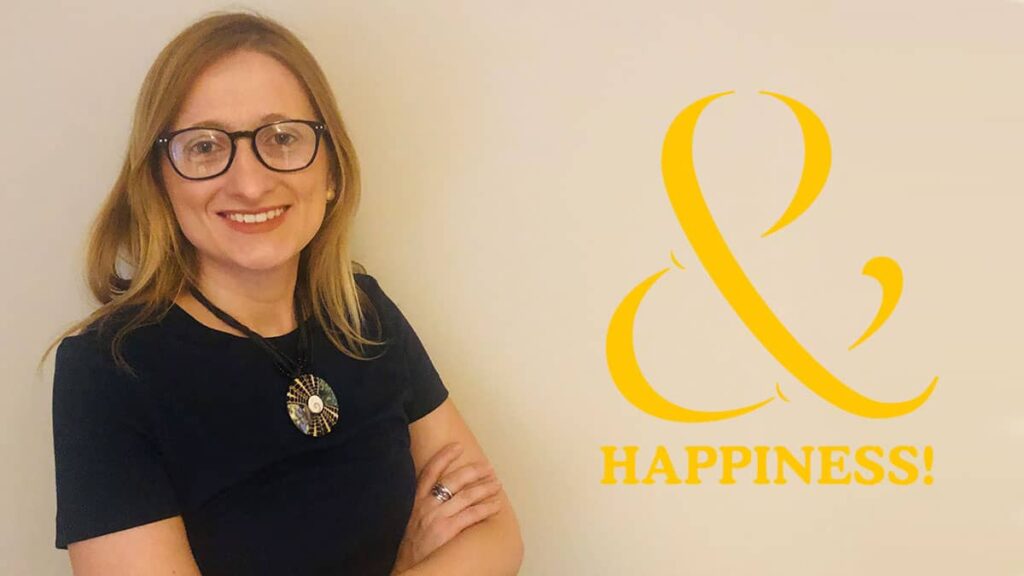
“But you are not going to ask for happiness itself. No one asks a genie, hey, genie, I just want to be happy. Everyone asks for certain components that are supposed to contribute to their happiness. But we’re saying every day that we just want to be happy.”
Are some of us naturally happier than others?
“And theory, yes, but in practice it is not that simple. Here you can look into research done by Sonja Lyubomirsky, who is a positive psychology researcher, and she based her research on a very extensive set of data, over 250,000 data sets. […] she estimated that even though our happiness is determined by 50 % of our genes, up to 50%, it is how your brain is wired up, your energy levels, your body, your neurotransmitters, that’s all that matters.”
“They established something called happiness set point […]”
“However, 10 % is, that happiness set point is impacted 10% only by circumstances that we are in, so the external factors, but what truly matters is the 40 % which is directly linked to the activities and habits that we repeat daily.”
Klaudia’s hospitality background: A place where you can meet humans every day.
Can a more digital world affect our social connections?
“So, I think that’s a tricky question, Michael, I must say, because I think we are still waiting for lots of different types of research to show us that impact and now we are more in a hybrid environment, which I think, again, is impacting of how you’re feeling about your connections. But what we know generally about social connections and happiness is that they do matter, they truly matter.”
“One of my guests on the podcast was Robin Dunbar, who is a professor of evolutionary psychology at the University of Oxford. He actually makes it very clear through his research that actually friendships, friendships are vital to our happiness. Not only that, he says that the single best predictor of our psychological health, well-being and even how long we’re going to live is the number and quality of close friends that we have. Okay, and then I challenge him saying, well, great, but how do we even measure the quality of friendship? And, you know, we all have friends that are a little bit…”
“[…]And again, he speaks about the ‘quality of friendships’ in terms of our friends. He calls them friends, our shoulder to cry on friends. Okay, so if something could be happening in your life that you need a helping hand, who would you call? And who is that person that will drop everything they do and raise back to help you? That’s your quality friendships. And those friendships are what matters when it comes to happiness. Because first of all, it’s about the connection and we need to have a certain sense of belonging to feel happy and acceptance. And that’s what friends do. They criticize with love. They lift us up when we need it. And they say, hey, you are a wonderful human being. And I’m so glad that you are in my life.”
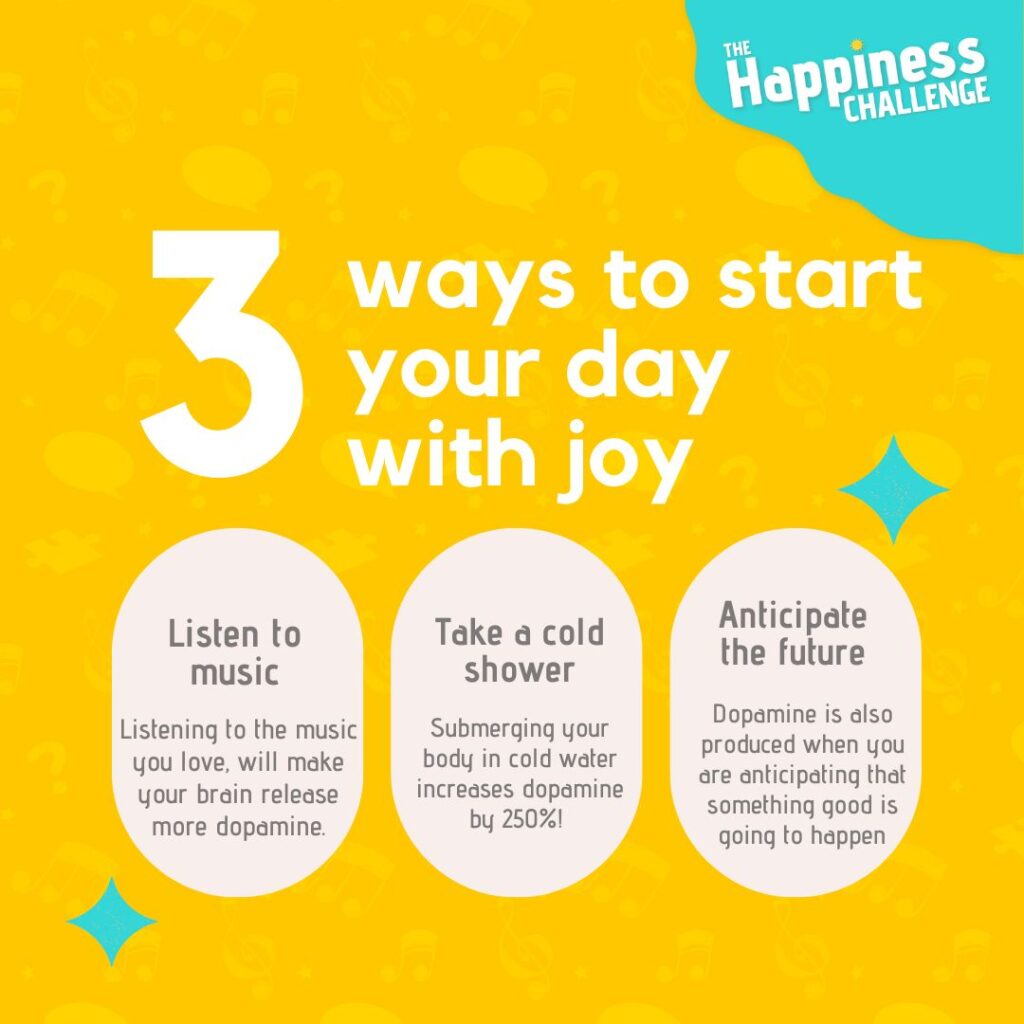
“And secondly, it’s about the fact that we do become who we hang out with. So again, there is so much interesting research around the fact that we become our friends, we become our social network. So if we want to be more happy, then think about your friendship and whether you’re hanging out with people who are happy and contribute to your happiness.”
“And Professor Robin Dunbar really encourages that, that yes, it’s great. We live in an era of technology and we can connect with care and let’s keep that connection. But face-to-face being with each other is so important because when we are with each other you tap your friend on the shoulder, they give you a hug. You look into each other’s eyes and what happens? Your endorphins, your endorphins are, you know, shooting all over the place. And what that means is that that boosts our immune system. So that’s why he, in his research, is able to link.”
Author’s Note: Transcribing this made me look back at my time working in hospitality. I am filled with emotion when I remember the great friends I made. Even today, I can still catch up with them over a cup of coffee/tea or a drink.
How can we cope with negative emotions? How do we make them a natural part of life?
“I don’t think we should be kind of smiling when we don’t feel it, uh, laughing in the face of difficulties, uh, staying positive, despite everything that is happening. I really think that is great, good advice someone gives you, but actually, it’s not useful. And it’s actually not healthy either. It’s okay not to be okay. And the fact that you’re not experiencing negative emotions is actually not an indicator of positive well-being because you might be in denial. You might be completely shuffling all those negative, difficult feelings somewhere and you don’t want to feel them. That is not an indicator of positive well-being.”
Discover the secret to workplace happiness by tuning in to Klaudia Mitura’s Hospitality Maverick podcast episode. Don’t miss out!
Do you like our content? Share with a colleague!



